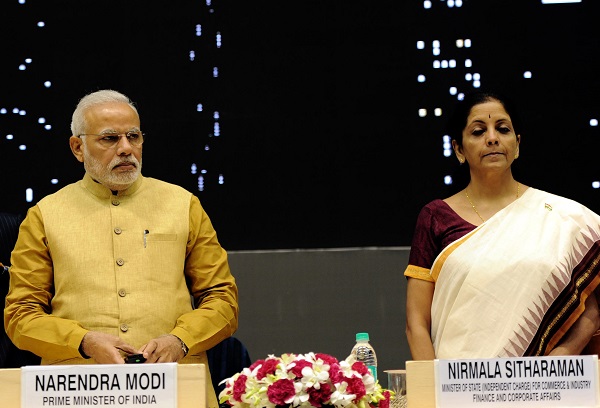New Delhi, Prime Minister Narendra Modi on Thursday took stock of the prevailing economic situation of the country with Finance Minister Nirmala Sitharaman on Thursday.
Official sources, however, said such meetings are routine, emphasising that any stimulus would be through policy intervention rather than through any fiscal incentive directly.
All the five Finance Ministry secretaries were present present during the meeting.
Sources said it is difficult to expect some specific outcome from the meeting, adding Sitharaman briefed the Prime Minister on the feedback she has received from the industry through a series of meetings with them.
There was no official comment on the meeting between Modi and Sitharaman.
Officials declined to comment if there would be a rollback or reconsideration of the surcharge on the super rich where FPIs not registered as companies are being affected.
According to latest depositories data, foreign portfolio investors (FPIs) withdrew Rs 11,134.60 crore from equities during August 1-9. Overseas investors have been on a selling spree ever since a higher tax on FPIs registered as trusts and association of persons was announced in the Budget.
The surcharge has taken effect after presidential assent to the Finance Bill, but the government is yet to notify it. The Finance Minister held a meeting with market participants, including FPIs, to take stock of the issues they face. FPIs pitched for a rollback of the increased surcharge and removal of long-term capital gains tax on equities to perk up market sentiment.
Earlier in the week, the auto industry reported that in July 2019, sales have hit rock bottom, recording the biggest year-on-year (YoY) sales decline of 30.98 per cent which the auto industry has witnessed in almost two decades. It was in December 2000 that the industry had faced a bigger YoY decline than the current slippage. The downturn is a result of the overall economy slowdown which has taken a toll on the customer sentiment and the passenger vehicle (PV) segment which was the fastest growing segment in terms of sales has taken the strongest blow, as per SIAM data.
Auto industry is unanimous on its demand for GST cut to 18 per cent from the current 28 per cent to tackle the slowdown.
Sources said given the limitations of the government finances, a stimulus would not have any revenue impact on the economy and would be more of a policy intervention.
On Tuesday, the government notified ‘Partial Credit Guarantee Scheme’ for state-run banks to provide a one-time partial credit guarantee to public sector banks for purchase of pooled assets of financially-sound NBFCs. This is expected to open credit line up for NBFCs and also free the NBFCs of the dud assets.
The RBI also has also taken the unprecedented step of cutting 35 bps in repo rate which is equally aimed at lowering cost of borrowing for auto, housing and consumer loans which are at the core of consumption revival.










